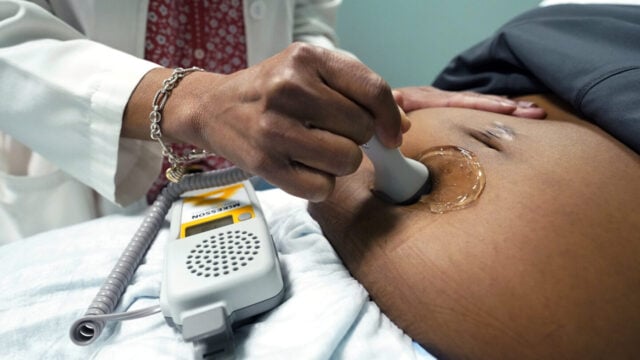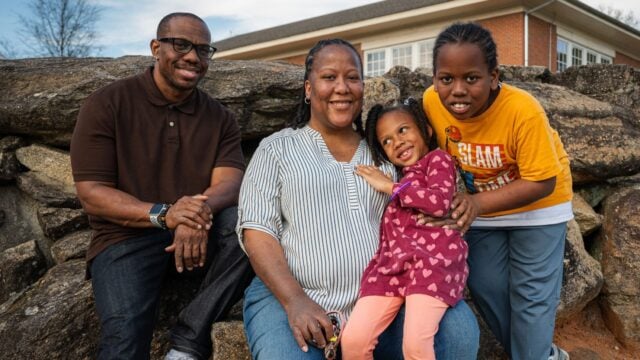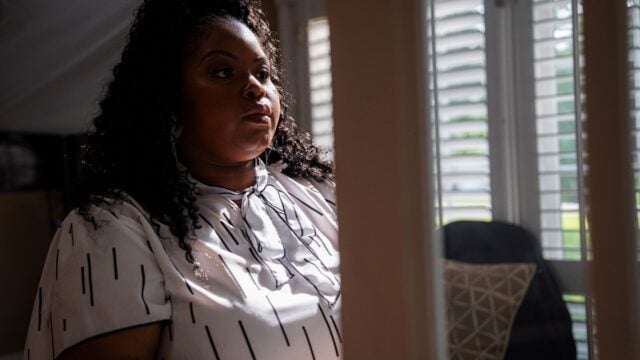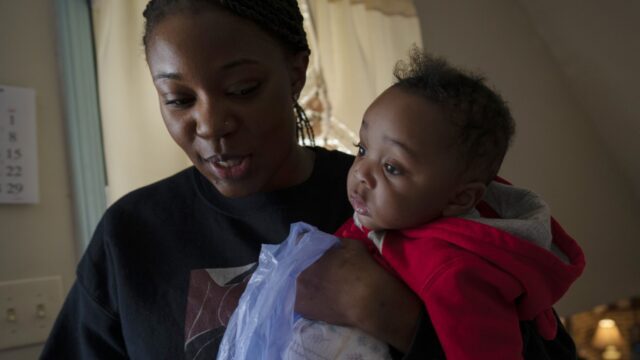It was two years ago when Sonnequa Madonia’s health problems first started with a constellation of urinary and gynecological symptoms that seemed to come out of nowhere.
“I was completely healthy. And then after having a baby,” she said, “everything plummeted. It just went downhill.”
She’s with her husband at the kitchen table in their apartment in Union City, about 15 miles south of the Atlanta airport. They recall how her symptoms and discomfort only escalated, even as Madonia saw doctor after doctor — and there have been a lot of doctors.
“Maybe six,” Madonia said.
From across the room her husband chimed in. “It was more than that,” he said.
“He says it’s more than that,” Madonia said. “I feel like it was at least six or seven different doctors. And that’s just within a year.”
Madonia said most of the doctors she saw just wrote out another prescription for antibiotics and sent her home. She got the impression many didn’t take her seriously.
“I feel like I might as well get more emotion or more concern from a wall. And sometimes you even walk out the doctor’s office just feeling stupid,” Madonia said. “I just said, you know what? I quit. I’m done. I’m not going back to the doctor.”
“There is inherent bias in every facet of the world. Doctors are not devoid of this,”
Dr. Samuel Cook, a medical resident with Morehouse School of Medicine
Madonia, who is Black, hesitates to say racism was a factor in how she felt she was treated by the healthcare system. But experiences like hers are not uncommon.
There’s increasing evidence that bias and discrimination can impact maternal health outcomes. Nationally, Black women report higher rates of discrimination by health providers than white women, according to policy and research organization KFF, which found the same is true for Hispanic patients.
The United States Centers for Disease Control and Prevention finds these negative healthcare interactions can impact pregnancy and childbirth outcomes.
In Georgia, Black women face the highest risk for severe pregnancy complications, and state public health data show they’re more than twice as likely as white women to die from maternal mortality.
“What we see nationally and across our members is Black moms, unfortunately, giving birth to a higher incidence of low-birthweight babies or being at a higher risk of maternal mortality,” said Dr. John Johnson, chief medical officer at the Government Employees Health Association, which administers benefits for more than 2 million federal employees and retirees, military retirees and their families across the country, including thousands in Georgia.
Johnson is one of many health officials in Georgia and nationwide increasingly advocating for doctors to be better listeners to catch pregnancy complications that could worsen and become severe.
“A lot of these warning signs are missed and could have been avoided but for the appropriate dialog that happens at the bedside,” he said.
“I feel like I might as well get more emotion or more concern from a wall. And sometimes you even walk out the doctor’s office just feeling stupid.”
Sonnequa Madonia after seeing a series of doctors for urinary and gynecological issues over a year
Studies back this up and also show that when doctors and patients share a common race or culture, it could improve communication and trust and help boost maternal health outcomes.
“There is inherent bias in every facet of the world. Doctors are not devoid of this,” Dr. Samuel Cook, a medical resident with Morehouse School of Medicine. “And so what we see is that Black doctors provide better care to Black patients because we come from the same communities.”
But doctors and patients shouldn’t have to have a similar background to provide high-quality care, he said — and, anyone who works with patients could benefit from healthcare bias training.
“Training in, this is how you treat a patient with respect,” he said. “You have to identify what’s important to the patient in the setting of their culture. And that helps you to help the patient make educated decisions about their care.”
Sonnequa Madonia has finally found a healthcare relationship like this. A few months ago, she said a family member referred her to a new doctor, a Black woman, who practices at a community health center.
“Everybody there was Black. So, it made it more comfortable for me to actually get everything out, be at ease, be a little bit more confident that my symptoms will finally be looked at and taken seriously,” said Madonia.
It hasn’t been easy. She’s been driving two hours each way to see her. But it’s worth the gas money, Madonia said.
“She’s a phenomenal doctor. Like, I’ve never had a doctor that was that concerned,” she said.
Still, she said race isn’t the most important factor for her when it comes to choosing a doctor.
What matters more to her, she said, is finding one who cares enough to treat her with respect and help her get better.
This story is part of our series Missing Moms: Inside Georgia’s Maternal Health Crisis. Jess Mador’s reporting is part of a fellowship with the Association of Health Care Journalists supported by The Commonwealth Fund. It is produced in partnership with the Georgia Health Initiative.



















